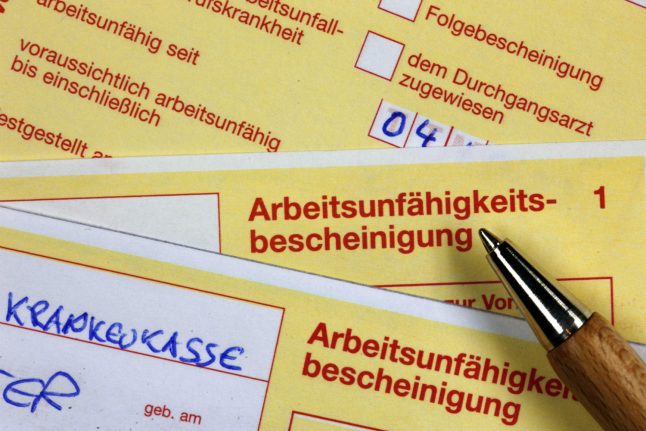But the yellow paper note – officially called a Arbeitsunfähigkeitsbescheinigung (incapacity to work certificate) is slated to be abolished and replaced by an electronic certificate as of January 1st, 2021.
Through a new regulation, doctors' practices will inform health insurance companies electronically about sick leave in the future.
The latter will then forward the certificate directly to the employer, and let them know about the start date and duration of the sick leave.
A bill to replace the long-standing paper gelben Scheine (yellow notes), as they are commonly known, was pushed forward by Economics Minister Peter Altmaier (CDU) as a way of minimizing bureaucracy.
Passed on Wednesday, it applies to all legally insured people in Germany, or about 85 percent of the population.
READ ALSO: German healthcare – Everything you need to know
Electronically submitted
The sick notification has previously consisted of several pieces of paper: One must be sent to the employer, one to the health insurance company, and one is intended for personal files.
Employees are usually required to give their employers this official notification after the fourth day of calling in sick. However, some employers may demand official proof as early as the first day of sick leave.
READ ALSO: The 10 rules you need to know if you get sick in Germany
While the new regulation officially goes into effect on January 1st, 2021, Statutory health insurance company Techniker Krankenkasse (TK) already has a pilot project for sick notifications to be transmitted digitally to employers.
An increasing number of people are taking sick leave in Germany each year, with an estimated 4.45 percent of publicly insured workers away from the office due to illness in 2019.

Graph prepared for The Local by Statista.
Yet some say that the plans don’t go far enough to relieve red tape. “One swallow does not make a summer”- and [one digital plan] doesn't yet make a law to relieve bureaucracy,” said Steffen Kampeter, Managing Director of the employers' association BDA, to DPA.
There have been previous attempts to reduce bureaucracy involved with sick notes. Late last year, a Hamburg start-up announced a plan to issue sick notes through WhatsApp after connecting patients and doctors.
However, health care companies were sceptical of the notes being accepted by all employers.
READ ALSO: Don’t use WhatsApp sick note service, German doctors advise
Germany’s grand coalition is planning further digitalization measures. In the future, it will be easier to store tax documents electronically. Furthermore, a digital registration form is planned for overnight stays in hotels.
Vocabulary
Abolish – abschaffen
Notification of sickness – (die) Krankmeldung
Doctor’s note – (die) Krankschreibung
Sick leave – (der) Krankenstand (KS)
Transmitted digitally – digital übermittelt
One swallow does not make a summer – Eine Schwalbe macht noch keinen Sommer



 Please whitelist us to continue reading.
Please whitelist us to continue reading.
Member comments